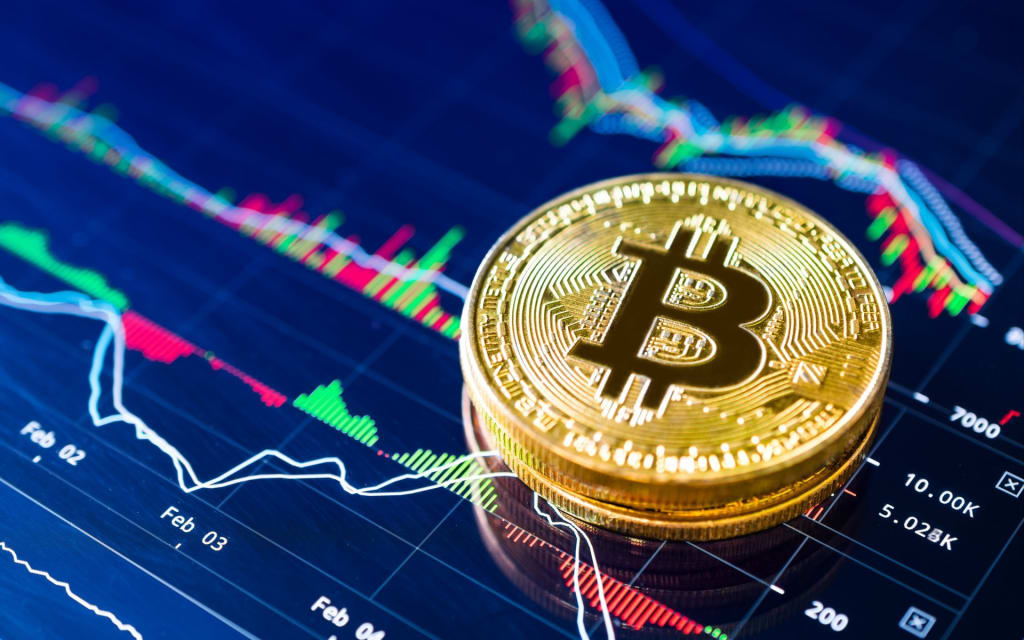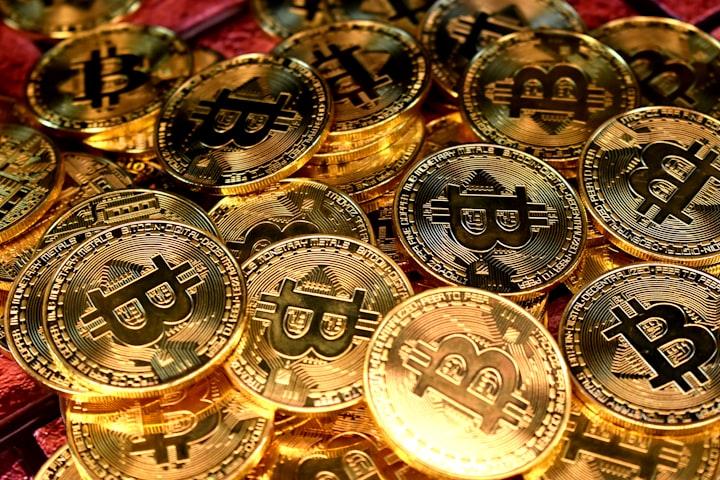Reasons Why Bitcoin Will Make a Comeback During the Next Recession
If there's anything good to come from our next economic collapse, it's that Bitcoin will make a comeback.

There's nothing scarier than a healthy economy when it feels like it was just yesterday that we experienced the worst financial crisis since the Great Depression. Over the last year, many experts have warned that the current thriving economy won't last forever and that another devastating recession could be just around the corner.
The thought of another financial catastrophe is enough to raise anyone's blood pressure.
But, hey, look on the bright side! The exciting part about the prospect of entering another global recession is that we'll finally get to see how sweet baby Bitcoin fares during an economic apocalypse.
At the moment, some see Bitcoin as the currency of the future; others see blockchain technology and initial coin offerings as no more than a slot machine and poker chips.
Believe me; when we're hit by another financial crisis, Bitcoin will look a whole lot more desirable to the skeptics.
When paper currency fails us, Bitcoin will make a comeback because that's what it was built to do.
Fiat currencies such as the US Dollar are controlled by a small group of government officials who have the power to increase or decrease its value by adding or removing money from circulation.
Although the centralized money system works well in theory, its flaws become especially apparent during recessions when money suddenly can't buy as much as it could 24 hours ago.
In contrast, Bitcoin is a peer-to-peer decentralized currency with a finite supply that is impossible to replicate. It was created by the people, for the people, as a means of protecting the public from falling victim to fiat currency's weaknesses as they did during the 2008 financial crisis.
To understand why this suggests that Bitcoin will make a comeback in the wake of economic turmoil, let's take a closer look at Bitcoin's two key tenets.
Unlike fiat currency, there is no exclusive body of people controlling the value of the Bitcoin. Instead, Bitcoin runs on a peer-to-peer system, so the people who use Bitcoin serve as the digital currency's central body.
If the 2008 financial crisis taught us anything, it's that you can't always trust bankers or federal government officials to make the right decisions when the economy is in turmoil. After all, they are human beings whose judgment can be easily clouded if they haven't had enough food or sleep in the last 24 hours, and they're capable of making unfair decisions based on their personal emotions and opinions.
That's not something you have to worry about with Bitcoin. It is totally objective because it is computer-generated. Bitcoin doesn't have opinions or experience sleep deprivation, "hangar," bad moods, or human error.
A 20 dollar bill would be just a piece of paper if there weren't a small group of people to assign a value to it. In other words, without central banks, paper money would be worthless because it's too easy to print and to destroy.
One way central banks try to combat recession is by printing out more money, and thus devalue or inflate the currency. The price of goods we buy with cash reflects the new inflated value of money.
That simply cannot happen with Bitcoin.
There is a finite total of 21 million Bitcoins available, none of which can be duplicated, replicated, or inflated. The only way for the Bitcoin priceto change is for the Bitcoin demand to go up or down.
Bitcoin is ideal for people who, after 2008, are hesitant to trust fiat currency again, and using the digital currency is a great way to bypass inflation in the modern age.
If a lot of people flock to Bitcoin in anticipation of a recession, the value of Bitcoin will rise. With this in mind, the possibility that Bitcoin will make a comeback in the wake of economic turmoil is very plausible.
Since Nakamoto's release of Bitcoin in 2009, it has spawned the birth of somewhere around 1,500 other cryptocurrencies.
If you're familiar with blockchain technology, crypto, and initial coin offerings, you might be wondering what makes Bitcoin so special.
First of all, Bitcoin's market cap is already lightyears higher than that of other digital currencies in the world.
Bitcoin is the OG of cryptocurrencies, so it has more publicity and, as a result, we have a lot more data on Bitcoin than we have on its cousins.
In other words, Bitcoin will make a comeback because it is the default system; it is the most trusted and most talked about digital currency.
As far as cryptocurrencies are concerned, Bitcoin is the household name. More people know about Bitcoin than any of the best Bitcoin alternatives of 2018, and more people know about Bitcoin than ever before.
Public awareness of Bitcoin is going to continue to grow, which means that more people will consider investing in Bitcoin. As we know, the higher the demand for BTC, the more valuable it becomes.
The growing popularity of Bitcoin means that, when people lose faith in fiat currency and invest in Bitcoin, they will drive up trade volumes, causing Bitcoin to make a comeback.
If the average person knows anything about cryptocurrency, it's usually Bitcoin. With a market cap worth over 50 billion dollars more than any other digital currency, it is clear that Bitcoin is the one people go to first.
Because Bitcoin is the most trusted digital currency, it's also the most widely used. Therefore, it's also the digital currency that commercial platforms are the most likely to accept and accommodate for—plus, using Bitcoin would benefit businesses by easing inflation-related concerns.
If you've been paying attention to the rise and fall of Bitcoin over the last decade, then you know that the Bitcoin price is volatile, and can change pretty drastically in as short a time as 24 hours.
Heck, you can even see the rapid fluctuation of Bitcoin when you stare at a real time chart for one minute. However, the Bitcoin market could become a lot more stable when big investors start getting involved.
The Intercontinental Exchange has already announced plans to set up a platform called Bakkt, which makes Bitcoin exchanges more accessible to the public.
In doing so, the Warren Buffets of the world will help stabilize Bitcoin by buying massive sums of it to sell to average Joe's and Josephine's like you and me.
A lot can happen in ten years, and enough has happened since the birth of Bitcoin for us to gather data on its behavior and usage, and to draw inferences on how stable the Bitcoin market is in the near future. It is certainly clear that Bitcoin thrives when fiat currency is in trouble.
There is a fascinating inverse correlation between Bitcoin and the US Dollar: The value of Bitcoin goes up when things aren't looking so great on Wall Street. For every decrease in the US Dollar's market cap, there is an increase in the Bitcoin market cap.
Considering the role that banks played in the 2008 financial crisis, can you blame Americans for being wary of fiat currency?
If the value of the dollar starts to decline to the levels we saw in 2008, judging by the correlation between the USD and BTC, it's reasonable to believe that we could see an inversely equivalent rise in Bitcoin's value.
When a country's economy starts to fail, the people lose trust in the central banks that decide how much value to assign printed pieces of paper, making a digital currency like Bitcoin, which can't be duplicated or replaced, pretty desirable.
To say the Venezuelan economy suffered from the collapse of their oil industry (and bad decisions made by Hugo Chavez) would be an understatement. One of the inevitable outcomes of the fiasco was extreme inflation that resulted in a currency crisis.
When the IMF warned Venezuela that their inflation could reach one million percent in 2018, the government responded within six months by ditching the Venezuelan Bolívar for the Sovereign Bolívar.
If you haven't experienced what Venezuelans did this year, and don't understand what any of this has to do with whether or not Bitcoin will make a comeback, imagine for a moment that your country's economy is suffering because your former head of state essentially destroyed the industry that keeps it on its legs. The result of his policies is astronomically high inflation that your new government attempts to combat by issuing a new fiat currency.
Given that scenario, what would you do if someone told you that you can buy into a peer-to-peer digital currency that is totally decentralized? If you were looking out for yourself, you wouldn't even have to think about it: Bitcoin would be the answer. That's what many Venezuelans decided to do. As a result, Bitcoin experienced trading volumes higher than ever.
We've seen the same thing happen in Iran as a response to new sanctions, and economic turmoil in Turkey also boosted Bitcoin's value. This raises the question: "Will Bitcoin crash and burn or rise again?" Only time will tell what the future of crypto holds, but Bitcoin shows signs of life in the world today.
About the Creator
Roland Barnes
Aspiring young money millionaire. Always strive and prosper. Get rich or die trying.






Comments
There are no comments for this story
Be the first to respond and start the conversation.